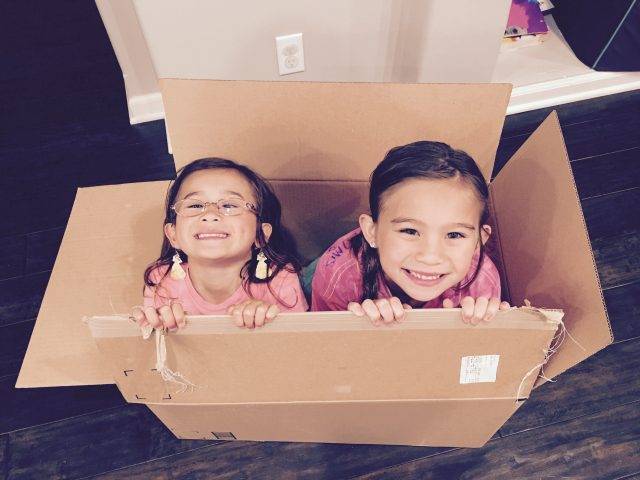Remember that scene from Big Daddy where Rob Schneider’s character is doing a spelling test with Adam Sandler and he starts with “Fish”, “Pony”, and then “Hippopotamus”. The first two are easy then he has trouble pronouncing the third so he says “Hip? Hip Hop? Hip Hop Anonymous?”. That’s kinda like the word “Autonomy”.
Now be honest. Who had to Google the meaning of the word?
Autonomy is essentially the process of being self-governing and independent. Yet how do we help our kids grow into separate, independent people? By allowing them to do things for themselves, by allowing them to wrestle with their own problems, and by letting them learn from their mistakes. Easy, right?
The Problems With Codependency
Parenting is a tricky thing. As a newborn baby, your child enters this world completely relying on you for all their needs, essentially they’re co-dependent. The rub is when your child ages and you continually treat them (intentionally or unintentionally) as the helpless newborn they once were. The book lists out several examples of something a parent might say to a child. Try to imagine how you would respond if these were said to you:
- “Are you sure you don’t have to use the bathroom? I think you should go.”
- “You look tired. You should go lie down and rest.”
- “Here, give me that jar and I can unscrew the cap for you.”
- “I don’t feel comfortable with you learning how to drive, I’m too nervous about accidents. I’d be happy to take you wherever you want to go. All you have to do is ask.”
- Imagine you’re a citizen of a new nation and you attend a public meeting. The speaker is a visiting dignitary from a rich, powerful country and he says:
“Because your nation is still in its infancy and is as yet undeveloped, we are not unmindful of your needs. We plan to send you experts and materials to show you how to run your farms, your schools, your businesses, and your government. We’ll also send professionals in family planning that will help you reduce your country’s birthrate.”
I’m guessing that many of you didn’t put favorable feelings down as your response to these statements. When people are placed in co-dependent situations it can easily cause feelings of helplessness, worthlessness, resentment, frustration, and maybe even anger. On one hand, our children are clearly dependent on us for many things. On the other hand, the very fact of their dependency can lead to hostility.
So where does that leave us? How do we help our children become independent without damaging our relationship with them in the process?
Ways to Encourage Autonomy
Much like Chapter 2 on Engaging Cooperation, the book lists several methods as a way to encourage autonomy among our kids. There’s no sequential order to follow and you can use any mix of the following techniques based on your child and situation. Here are the steps to encourage autonomy:
1. Let Children Make Choices– “We have to leave in 2 more minutes, do you want to go down the slide one more time or stay on the swing?”
Choices give children valuable practice in making decisions. By allowing them to learn to make decisions now (by weighing their options) we’re equipping them with experience to make adult decisions later in life. *Caveat: Giving them choices as a way of manipulation doesn’t work. For instance, if you say “You need to get a haircut. You can either get a haircut so you can sit with the family for Thanksgiving or you can eat Thanksgiving dinner up in your room by yourself?”
2. Show Respect For a Child’s Struggle– “Adding fractions can be hard. It’s not easy to find a common denominator.”
When you respect their struggle, they can gather the courage to see the task through. These are the same principles from Chapter 1 in the book.
3. Don’t Ask Too Many Questions– “How was school today? Who did you eat lunch with? What games did you play at recess? How was your spelling test?”
Instead, you might say “I’m so glad you’re home!” and leave it at that.
Too many questions can come off as an invasion of privacy. Children will talk about what they want to talk about when they want to talk about it. Many of us in the group felt that when we asked lots of questions, it showed our concern and care for our kids. We didn’t realize that it could be burdening them when they simply wanted a mental break from all the learning at school.
4. Don’t Rush to Answer Questions- “Where does rain come from?” and the parent says “Rain is caused by evaporation and condensation of moisture. You see what actually happens is…”
Instead, you might say “That’s an interesting question. Where does rain come from?”
When children ask questions, they deserve the chance to explore the answer for themselves first. It’s incredible how often I use this with my own kids. Oftentimes, kids can ask questions such as “Why?” as a stall tactic, but when I ask the question back to them it gives them a sense of dignity to search for the answer. (Pro Tip: They usually know the answer before they ask “Why?”)
5. Encourage Children to Use Sources Outside the Home- “Mom, my pet frog looks sick. What should I do?” and the parent responds with “Hmm…I wonder if the pet store owner might have ideas.”
We want our kids to know that they’re completely not dependent on us. The world outside the home (or on the internet) is at their disposal as well. My kids have become best friends with Siri.
6. Don’t Take Away Hope- “I want to get a pony.” and the parent responds with “A pony? That wouldn’t work. We live in the city, we don’t have a stable, they’re expensive to care for….”
Instead, you might respond with “Is that so? Tell me more about it.”
By trying to protect them from disappointment, we deprive them of hoping, striving, and dreaming. They will get to an age where they may realize that a pet pony may never work, but let them discover that for themselves. Don’t be the one snuff their dreams.
Why Is It So Hard to Let Go?
I’ll admit, the idea of children being in charge of the details of their lives was revolutionary. I grew up with the belief that good mothers/fathers did everything for their children. When we “do” things for them, we also have a tendency to think for them. Result? Every day, over every little thing, there would be a battle of wills, ending in tension and bad feelings all around.
But there are really two main reasons we find it so hard to let go and allow children to be independent.
Sheer Convenience
It’s much quicker for me to tie their shoes, dress them, pick their (matching) clothes, prepare their lunch, etc. Quite frankly, when you have young kids it always seems like you’re rushed to get out the door and be somewhere. It’s just easier/quicker for everyone if Mom or Dad do it.
Wanting to Be Needed
There is a deep, personal satisfaction that comes from being needed by our children. For some of us, we feel loved when we know we’re needed- truly needed.
As parents, it completely kills us to ever see our child in pain. We’re quick to come to their rescue with advice or solving their problems (be it emotional, financial, etc.) We’re saving them from the inevitable heartbreak that we know awaits them. Yet in doing so, we’re depriving them of experiencing pain that is necessary for growth, maturity, and eventually autonomy.
There will come a day they no longer need you to hold their hand to cross the street, no longer need you to dress them, or no longer need you to walk them up to school. Instead of resisting the inevitable and stifling their growth, embrace the season that you’re in for the things they do need you for now. Because if you haven’t experienced it already, there will come a day when you will wake up and walk your oldest child to kindergarten and time only speeds up from thereon.
I know this from experience.
Real Life Examples from Our Book Group
Growing up, my parents were pretty “hands-off”. I swore to myself that when I had children of my own, I would barrage them with questions when we were reunited after a school day. After reading this chapter, I’ve taken a step back to really only say “I’ve missed you, I’m so glad to see you” and then I let my daughter elaborate if she chose. I’ve even gone as far as asking her “Honey, what do you want me to say when I pick you up from school?” Her response was “Ask me how my day was and then tell me how you’re glad to see me.”
I still do that to this day.
I was tucking my kids in bed and my daughter protested by saying “Why do we have to go to bed so early at 8 o’clock?!”. Normally I would have responded with “Because you know you have school tomorrow and you need to get lots of rest so you’re not tired.” This time I respond with “Why do we have to go to bed at 8 o’clock? Why can’t we just stay up all night and play?”
She looked down at herself and said, “Because we have school tomorrow.”





